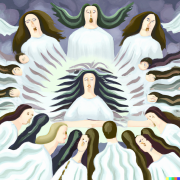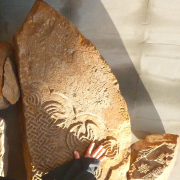Structure
In this post-Pentecost week, we have been talking about certain characteristics of the Church which point to structure and discipline. Whether its order vs. chaos or the canon laws of the church, it becomes clear that the Christian Church has a structure and a system of operations, which often becomes difficult for people, especially in the West, to understand and accept. We have a tendency to oversimplify some of the most critical and important concepts in Faith.
We have all heard preachers who call people to a “Bible based Church.” That’s fine and certainly within their prerogative, but the Apostolic Church was and continues to be a “Jesus based Church.” This is not merely a word play, but a built-in mechanism to assure that faith is beyond words, but actually engaging with Christ. Often, we hear a preacher or Christian teacher take a passage from one book of the Bible, verify it with a passage from another book, justify it with yet another verse from yet another book. The Bible was never meant to be read like that. The Bible is one book, about God’s love for us. From beginning to end, it is one book. It has its place within our Church – the collective body of Christians – as the “Աստուածաշունչ,” that is, the “Breath of God.” It is sacred, as the Breath of God certainly is.
As we learned, from Ascension to Pentecost, the Church took form. And through the centuries the Church evolved, like all living bodies. But the centrality of Christ never changed because the structure, the discipline of the Church was codified in the canons. This is what gave order and stability to the Church. There is a hierarchy within the Church made up of bishops, priests and deacons, and each has a role. This structure comes from the Apostolic era. We believe that the Holy Spirit guides the Church, and calls individuals to the collective work of the Church, each according to the gifts given to them.
As we conclude this post-Pentecost week, we read St. Paul’s message concerning the different gifts of the Spirit and how it is essential to honor the structure, the order and discipline of the Body. In reading it, we understand even in those early years of the Church’s history, this rebellion against structure was at issue. But we also hear that structure, order and discipline were essential for the Church.
From the 12th chapter of St. Paul’s first epistle to the Corinthians, he writes,
There are diversities of gifts, but the same Spirit. There are differences of ministries, but the same Lord. And there are diversities of activities, but it is the same God who works all in all. But the manifestation of the Spirit is given to each one for the profit of all: for to one is given the word of wisdom through the Spirit, to another the word of knowledge through the same Spirit, to another faith by the same Spirit, to another gifts of healings by the same Spirit, to another the working of miracles, to another prophecy, to another discerning of spirits, to another different kinds of tongues, to another the interpretation of tongues. But one and the same Spirit works all these things, distributing to each one individually as He wills.
For as the body is one and has many members, but all the members of that one body, being many, are one body, so also is Christ. For by one Spirit we were all baptized into one body—whether Jews or Greeks, whether slaves or free—and have all been made to drink into one Spirit. For in fact the body is not one member but many.
If the foot should say, “Because I am not a hand, I am not of the body,” is it therefore not of the body? And if the ear should say, “Because I am not an eye, I am not of the body,” is it therefore not of the body? If the whole body were an eye, where would be the hearing? If the whole were hearing, where would be the smelling? But now God has set the members, each one of them, in the body just as He pleased. And if they were all one member, where would the body be?
But now indeed there are many members, yet one body. And the eye cannot say to the hand, “I have no need of you”; nor again the head to the feet, “I have no need of you.” No, much rather, those members of the body which seem to be weaker are necessary. And those members of the body which we think to be less honorable, on these we bestow greater honor; and our unpresentable parts have greater modesty, but our presentable parts have no need. But God composed the body, having given greater honor to that part which lacks it, that there should be no schism in the body, but that the members should have the same care for one another. And if one member suffers, all the members suffer with it; or if one member is honored, all the members rejoice with it.
Now you are the body of Christ, and members individually. And God has appointed these in the church: first apostles, second prophets, third teachers…. Are all apostles? Are all prophets? Are all teachers? Are all workers of miracles? Do all have gifts of healings? Do all speak with tongues? Do all interpret? But earnestly desire the best gifts. And yet I show you a more excellent way. (NKJV)

 2023 Fr. Vazken
2023 Fr. Vazken 2023 Epostle.net
2023 Epostle.net 2014 Fr. Vazken
2014 Fr. Vazken Fr. Vazken Movsesian 2023
Fr. Vazken Movsesian 2023 2025 Fr Vazken
2025 Fr Vazken




 2023 Fr Vazken
2023 Fr Vazken
Leave a Reply
Want to join the discussion?Feel free to contribute!